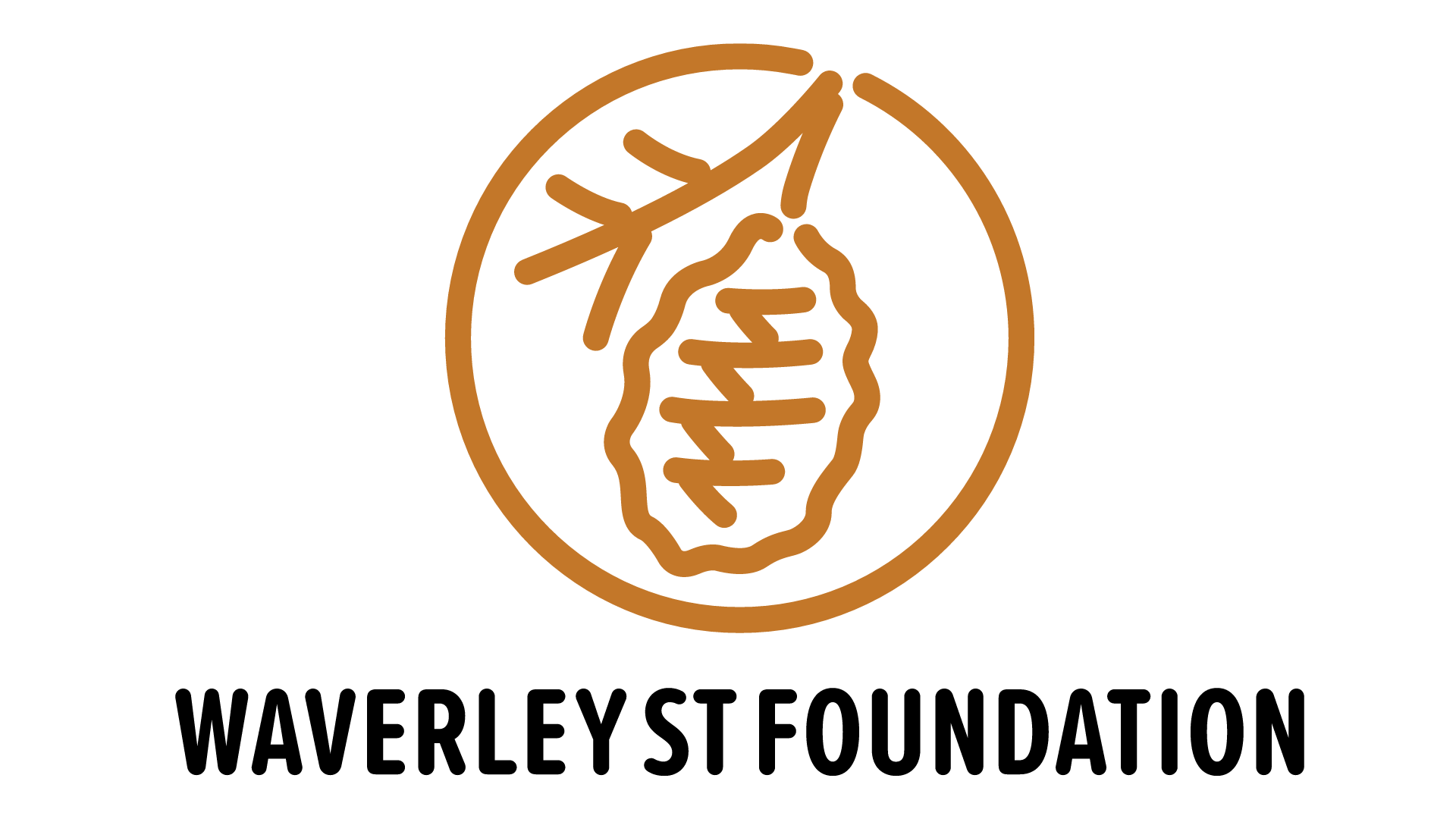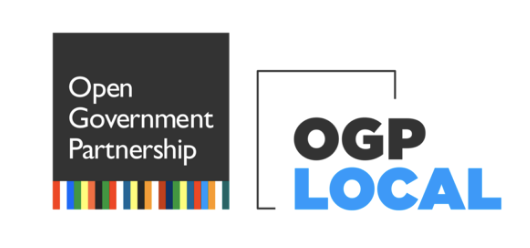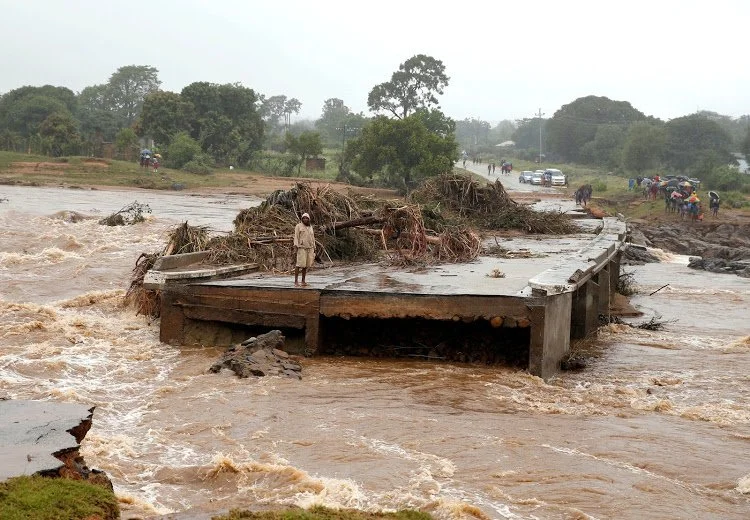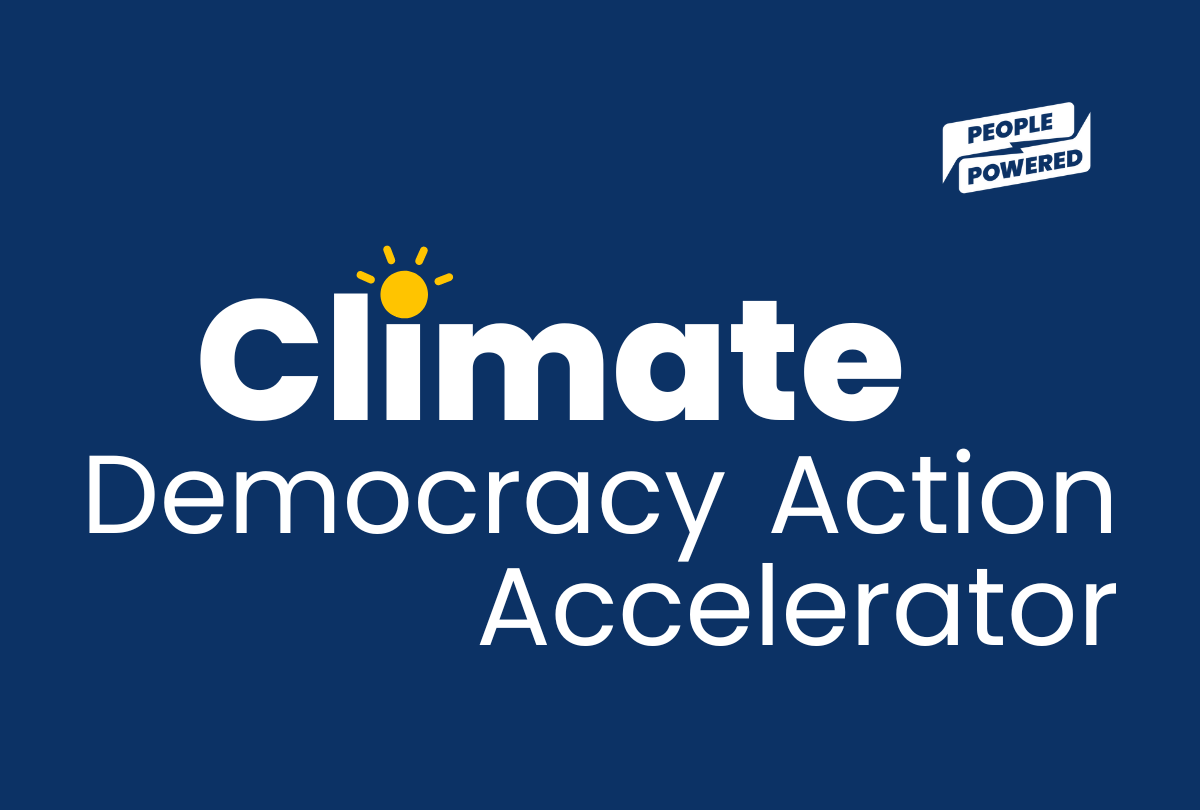Climate change is a global issue affecting every aspect of our modern society, from declining agricultural productivity, rising sea levels, drought, forest fires and catastrophic flooding. To tackle the climate crisis, governments have a mandate to enable and encourage citizens, civil society, activists and more to participate in shaping and implementing climate policies. By expanding public participation and bringing marginalized voices into decision-making, governments can create climate-focused policies that are equitable and responsive to community needs.
People Powered is looking for government and civil society leaders to form a new cohort of innovators interested in launching participatory programs to shape climate policy on topics such as regenerative agriculture, renewable energy, just transitions, clean transportation, decarbonization, and more.
To be selected for this program, applicants must be from governmental institutions, civil society organizations, or non-governmental organizations. The program is open to applicants from all over the world, with 15 spots per cohort.
The Climate Democracy Accelerator (CDA) is a six-month, practice-oriented training and support program that prepares members to plan and implement an inclusive and participatory process for a just climate transition. Participants will develop a project to implement a climate-focused participatory program that addresses the needs and voices of local communities. Selected applicants will have access to a dedicated mentor to guide the development of their program, along with:
Step-by-step resources such as the Participation Playbook, our interactive, online tool for designing participatory programs.
Practice-oriented live sessions and online courses.
A 10,000 USD implementation grant.
The opportunity to apply for an additional 20,000 USD award for the best project developed by program participants.
Climate Action Impacts
The Climate Democracy Accelerator has launched over 50 climate action and citizen engagement programs around the world since it’s inception in 2023. Learn more about the success stories!
Learn about current and past CDA participants
What is the application process?
Applications closed on December 1, 2024.
Program timeline:
October 8–December 1, 2024: Applications were open until December 1, 11:59 pm UTC (check your timezone here).
January 2025: Selected participants are notified.
February–March 2025: Due diligence and onboarding.
February 2025: Program begins.
August 2025: Program ends.
August–September 2025: Participants share learnings.
September 2025–August 2026: Participants implement their action plan.
Program timeline.
More application details
Government officials, staff members and policymakers who want to launch a participatory program for making just climate-related decisions. Please note: Government institutions applying must have a partnership with a civil society organization/non-governmental organization, as the grant recipient must be a non-governmental entity.
Civil society organization staff members and/or climate advocates who want to implement a participatory program focused on climate in partnership with a government institution. Please note: Civil society organizations applying must work in partnership with a government institution, as they must follow up with the implementation of the action plan.
Organizations should nominate a lead participant with professional proficiency in at least one of the following languages: English, French, Portuguese or Spanish. Applications from organizations or governments based in G20 countries are encouraged, especially from Brazil, India, Mexico, South Africa and Indonesia. People Powered or Open Government Partnership members will be prioritized.
Please note that the CDA selection is a very competitive process. We prioritize applicants who can clearly demonstrate that the program's training and support will concretely address their capacity-building needs. Former accelerator participants who want to be considered for a new program cohort should not be in their grant implementation period and present strong evidence of the additional capacity-building they need from the same training.
People Powered cannot give funds to volunteer groups or recently incorporated civil society organizations through this program. To receive funding, your organization needs to:
a) Demonstrate at least one full year of operations and successful fundraising to support such operations before being short-listed for the program.
b) Have paid staff and a board of directors or advisory committee.
c) Be registered as a non-profit organization in the country of operations.
Successful applicants will receive a 10,000 USD implementation grant at the end of this program. To receive this grant, the conditions below apply. Please review these requirements and make sure you will be able to provide this information. The below applies to civil society organizations only, as they will be the recipients of the funding. Government institutions applying for the CDA program must ensure that their civil society partner meets the below eligibility requirements.
Provide financial statements or audited accounts for your organization. We usually only ask for 12 to 24 months of financial statements (for example, your current fiscal year and your previous fiscal year).
Provide evidence of your organization’s charitable or non-profit status. For example, your legal registration form or articles of association (also called ‘bylaws’).
Complete a tax form that People Powered needs to provide for its own tax purposes as an organization making grants to others. We will send this to you for completion as part of due diligence.
Have a valid organizational bank account and be able to provide your bank information to People Powered in order to receive the grant.
If you are a government body or organization, we will ask for a Memorandum of Understanding (MoU) with the civil society partner who will receive the grant.
Once we review and approve the required documentation, the organization will benefit from the program’s 10,000 USD funding support.
This current CDA cohort consists of 15 government and civil society leaders. It will start in February 2025 and end in August 2025. In this cohort:
Participants can expect to spend an average of two to three hours per week from March to August 2025 for the duration of the training program and mentoring support.
Participants also will be asked to set aside a few key dates on their calendars to participate in the program’s live Zoom sessions.
After the completion of the training, participants will have 12 months to implement their action plan with the 10,000 USD funding received. The amount of time you spend on your project will depend on the action plan you have developed.
Develop an action plan (project) to be implemented, with the support of the program resources.
Engage internal and external stakeholders to develop an action plan.
Attend and participate in dedicated training and mentorship/peer support activities and discussions.
Report on project progress through surveys and learning reports
Engage with other cohort members to support each other’s work
The application form contains the following questions:
In no more than 200 words, please describe your proposal for a participatory or deliberative project to address a climate challenge.
In no more than 150 words, please describe the climate challenge you would like to address.
In no more than 250 words, how will your participatory or deliberative project support a just transition in your context? How will you engage marginalized or excluded communities in this work? A just transition refers to a future in which the worst impacts of the climate crisis are mitigated, communities have adaptive capacity, and the effects of the climate crisis are more equitably distributed. Marginalized groups or communities can include climate-vulnerable populations, immigrants, refugees, disabled people, religious minorities, ethnic and racial minorities, youth and children, elderly people, women, and LGBTQ+ people, among others.
In 100 words, describe one key experience that demonstrates how you have worked in partnership to deliver a participatory or deliberative program to address a climate challenge. If you haven’t had experience with this, please provide one example of a climate program you have delivered and a partnership you have worked in successfully.*
In 100 words, what will you try to accomplish by participating in the CDA program? Share how the program support and grant will help your organization to achieve your goals. Please be as specific as possible.
Additional information: Is there any specific support you will need from the program or any additional information you would like to add?
Learn more about our CDA expert committee
(Clockwise from top left)
Anoka Abeyrathne, Sri Lanka
Co-Founder of Growin’ Money
Anoka is a social entrepreneur, policy advocate and campaigner. The co-founder of Growin’ Money, she is a graduate of the University Cambridge’s Judge Business School. With a background in supporting climate democracy and over 10 years of experience across the United Nations, British Council, Change.org and the corporate sector, Anoka is well versed as a master facilitator mentoring over 500 changemakers globally in climate action and participatory democratic processes leading to successful outcomes. Anoka is a Forbes under 30, S World Economic Forum New Champion, IVLP of the United States Department of State, Cosmopolitan under 35 and British Council International Climate Champion
Don Powa, Argentina
Co-Founder and Co-Executive of Democracia en Red
Don is an activist who designs, develops and implements ecological transition, civic technology and citizen participation projects. He is the co-founder and co-executive director of Democracia en Red, an NGO dedicated to the creation of citizen participation solutions and civic technologies for governments and political movements. He is also co-founder and member of the advisory board Amartya, an association that promotes ecological transition, and the co-founder of the ecological literacy center, Quinta Esencia. He is a permanent member of the climate change advisory council of the Autonomous City of Buenos Aires, the coordinator of the Latin American Political Innovation Network and sponsor of the environmental promoters coop and urban recyclers El CorreCamino.
Mateusz Wojcieszak, Poland
President of Field of Dialogue Foundation
Mateusz is the President of the Board of the Field of Dialogue Foundation, a non-profit organisation that promotes the participation of citizens in public life and creates tools to facilitate dialogue. He is interested in the practical strengthening of the voice of citizens in cities, schools and public institutions. He co-organised the first climate citizens' assembly in Warsaw, where 90 randomly selected people developed binding recommendations on the topic of energy efficiency for the City Mayor. Together with dozens of community organizations, he is active in SOS for Education, where a broad partnership is creating a new vision for public education in Poland adapted to the 21st century. Former Commissioner of the Mayor of the City of Radom for Youth Affairs. Board member of the National Federation of Non-Governmental Organisations, the largest NGO network in Poland.
Colombina Schaeffer, Chile
Sociologist at the Pontifical Catholic University of Chile
Colombina is a Sociologist (Universidad Católica de Chile) with a PhD in Government and International Relations (University of Sydney). Colombina has worked in academia and civil society organizations researching democracy and civic participation, environmental movements and politics, social movements, and the intersection between science and technology. She has experience managing civil society projects and organizations, such as Verdeseo (founder, editor, and coordinator), Programa Chile Sustentable NGO (project deputy director), Red Latinoamericana de Recicladores and Ecosistemas (consultant), and is currently Ciudadanía Inteligente's deputy director. She lives in Santiago, Chile, with her partner and their two children, Simón (10 months) and Damián (3 years).
Oluchi Igili, Nigeria
Visiting Fellow at the University of Amsterdam
Oluchi earned her PhD from the University of Amsterdam where she is currently affiliated as a Visiting Fellow. During the Chicago conference of the Pedagogy and Theatre of the Oppressed (PTO) in 2015, she encountered the Legislative Theatre methodology which resonated deeply with her and aligned with her interest in the application of theatre as a veritable platform for addressing existential challenges in society. Her interest in participatory democracy informed her PhD dissertation, “Let’s Make the Law Because We Live the Law: New Perspectives on the Role of Political Theatre in Nigeria”. She is a university teacher whose teaching and research interests include Theatre as political activism, Theatre for Development (TfD), postcolonial and decolonial thought-practices, and popular culture.
Maryanne Wanjiku, Kenya
Program Officer at Institute of Public Finance
Maryanne is a Public Finance Management specialist with 6 years of experience, with a deep understanding of budgetary processes and public financial management systems. My expertise lies in designing and implementing capacity-building programs aimed at improving citizens' ability to participate in government decision-making processes, particularly at the national and county level. Throughout my career, I have collaborated with various stakeholders, including civil society organizations, government agencies, and development partners, to promote transparency and accountability in public finance. Expert at using acquired skills and knowledge to create more inclusive and equitable societies by advocating for the improvement of service delivery and better allocation of public resources.
Paulo Francisco, Portugal
Senior Officer at PlanAPP
Paulo Francisco currently works as a Senior Officer at PlanAPP, where he is developing LAB2050, a collaborative laboratory focused on creating sustainable futures for Portugal by 2050. Prior to this, he served as an advisor to the Vice President of Loures City Council, overseeing municipal measures in various areas including Citizen Participation and Youth Affairs. Between 2020 and 2021, Paulo was the Head of the Youth Department at the Portuguese Institute of Sport and Youth, working closely with youth associations and student groups. In 2015, he was appointed Head of the Organizational Innovation and Participation Division at the Lisbon City Council, managing the annual Participatory Budget cycles and the development of various participatory initiatives, including the Lisbon Participation Portal and LisboAideia participation modules.
Anna Wien, Czech Republic
Managing Director of Participation Factory
Anna is the managing director of the Participation Factory, a social enterprise that helps governments and communities improve governance systems and quality of life through better participation and robust data. Anna leads the company’s operations and manages complex participation projects, in particular focused on system participation, building infrastructure and internal capacities for a sustainable participation agenda within government institutions. Anna has experience in sustainable development and urban planning projects, participatory planning and community engagement. In the past, Anna co-founded and led the Public Space Network in Nairobi, Kenya introducing a participatory public space management system bringing together communities, local government, experts and other stakeholders in order to improve quality of life and environment. The approach was recognized as a best practice for citizen engagement by several international awards and media. Anna's academic background is in urban policy from SciencesPo University in Paris.
Saha Balaganesh, Belgium
Policy Manager at Democratic Society
Saha is Policy Manager at Democratic Society. Saha brings her economics expertise and experience in youth participation to lead and develop Democratic Society’s role across Europe, focusing on democratic design and thinking about how citizen engagement can be embedded in policy. She played a major role in leading the evaluation of the Conference on the Future of Europe and currently works on European climate democracy. She is a European Commission-recognized expert on citizen engagement and participatory democracy.
Rizqa Hidayani, Indonesia
Program Manager at Kota Kita
Rizqa is an urban planner with a focus on building inclusivity and resilience in the development of cities. She believes that the development process should accommodate the voice of - and brings benefits to - the most vulnerable groups in the city. Currently, she is a Program Manager for the Climate and Urban Resilience Division at Kota Kita. She has been engaged in urban participatory planning activities and research since 2013 - in the fields of climate change adaptation and resilience, community development, and informality in 10 different cities in Indonesia. She holds a Master's degree in Urban and Regional Development from Diponegoro University, having previously completed her study on urban planning at the same university.



















